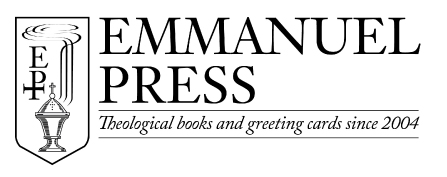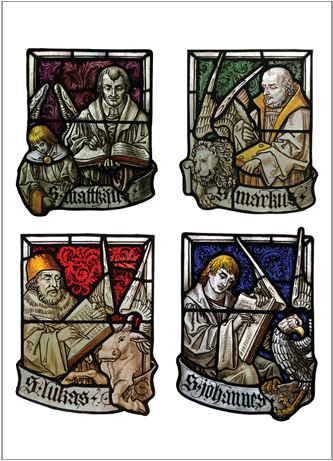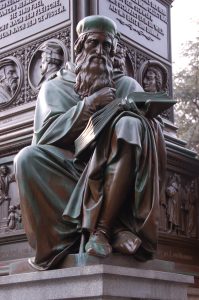Now Available: The Four Evangelists Greeting Card
The Four Evangelists, our newest greeting card, is now available! As stated on the back of the card:
These stained glass images come from a village church in Zwingenberg, Germany. Christian tradition has historically associated the authors of the four Gospels with the four “living creatures” that surround God’s throne, as described in Revelation 4:7 – Matthew (S. Matthäus) with a man, Mark (S. Markus) with a lion, Luke (S. Lukas) with an ox, and John (S. Johannes) with an eagle. The four evangelists are traditionally represented in paintings, carvings, or stained glass near or on the pulpit to show that the Word preached by the pastor is a proclamation of Jesus’ own words as recorded in the Gospels.
While this blank card is appropriate for any type of correspondence, it is especially suitable for ordinations, installations, or an anniversary of these, whether it be given to a pastor or used as an invitation to one of these occasions.
As a reminder, please visit the Ordering Information tab for details about bulk orders, shipping, and international orders.
Coming Soon: The Four Evangelists Greeting Card
We are putting the finishing touches on a new greeting card of the four evangelists, featuring a stained glass window found in a village church near our former home in Germany. We plan to have this card available within the next few weeks.
While this card is appropriate for any type of correspondence, it is especially suitable for ordinations, installations, or an anniversary of these, whether it be given to a pastor or used as an invitation to one of these occasions.
May God bless the seminarians from Fort Wayne and Saint Louis who prepare to receive a call into the Office of the Holy Ministry this week.
Now Accepting Book Review Submissions
Emmanuel Press is now accepting submissions of book reviews to be posted here on our website and also on our Facebook page. Subjects of interest include Lutheran theology, liturgy, hymnody, translations, and pastoral care resources. Whether you have written a review or are a self-published author having your book reviewed, please send submissions to emmanuelpress@gmail.com for consideration.
Be sure to read the inaugural review: The Lutheran High Church Movement in Germany and its Liturgical Work: an Introduction.
*photo of John Wycliffe (translator and publisher of the first English Bible in 1382) from the Luther Monument in Worms, Germany.
Book Review: The Lutheran High Church Movement in Germany and its Liturgical Work
The Lutheran High Church Movement in Germany and its Liturgical Work: an Introduction by Arne Giewald and Günther Thomann. www.Lulu.com, 2011. Paperback, 114 pages. $13.04.
Within the Christian church, worship is central. In the Old Testament, God gave very specific worship laws for the Israelites when they were rescued from Egypt and called to be His people. Jesus participated in 1st-century Jewish worship until He sacrificed Himself on the altar of the cross, perfecting and completing all of the Old Testament worship laws. However, His disciples and followers still gathered together in worshiping communities to “continue steadfastly in the apostles’ doctrine and fellowship, in the breaking of bread, and in prayers” (Acts 2:42).
All true Christian worship is founded upon and revolves around Christ. Having faith in Christ is the true worship of God, but how you do it does matter. The forms of the divine liturgy have not been prescribed in the New Testament, but church tradition does much to inform the “good order” that St. Paul encourages in Colossians 2:5.
As confessional Lutherans, we have a history of liturgical worship with periods of moving toward and also away from the traditions that we inherited from Luther’s Deutsche Messe (German mass). Luther did not create his order of the divine service out of thin air. He drew on the best traditions of the Christian church that he inherited. During the time of the Reformation, many Protestant groups began finding their liturgical rhythm apart from the Church of Rome, and out of this grew both pro-liturgical and anti-liturgical movements.
In The Lutheran High Church Movement in Germany and its Liturgical Work: an Introduction, Father Arne Giewald and Mr. Günther Thomann examine two such 20th-century pro-liturgical movements: the Berneuchen and the Alpirsbach movements in Germany. The authors evaluate their liturgical influence on the divine service and give biographical information on the movement leaders: Heinrich Hansen, Karl Bernhard Ritter, and Friedrich Heiler. These movements took place in the Evangelical Church in Germany (Evangelische Kirche in Deutschland), the Union Church, apart from what the Lutheran Church-Missouri Synod would consider “confessional” Lutheranism. However, anyone doing a study on liturgical developments in Germany at the time of the development of our sister church, the SELK (Selbständige Evangelisch-Lutherische Kirche), would find this book interesting. While the SELK was finding its way in the confessional Lutheran world, the movements of Berneuchen and Alpirsbach were trying to find their way within a Lutheran body (EKD) that was not receptive to high church movement. Giewald and Thomann reach back to the 19th-century roots of these two movements and give a short examination of other Lutheran voices who were calling for liturgical renewal on the “confessional” front, such as Claus Harms and Wilhelm Löhe.
The Berneuchen movement produced the Brotherhood of St. Michael (the author uses the term confraternity). It began as a secret group in 1931. Soon it began to struggle against the Nazi regime and found itself in opposition to the protestant groups that snuggled up to the Nazis. Within this brotherhood, a high church movement was started, which culminated in the production of a Missal entitled Die Eucharistische Feier (The Eucharistic Celebration), published in 1961. It included three services (low-mass, sung-mass, and high-mass), a full set of propers, and rubrics. The liturgies within the Missal were based on Luther’s Deutsche Messe and certain Eastern liturgies.
The movement of Alpirsbach began when many pious laymen wanted to bring plainsong into the church’s liturgy. In the early 1930s, they began to meet and deliver papers on Gregorian chant and the use of plainsong within the Protestant liturgy. Unlike the Berneuchen movement, they never developed a liturgy for the Mass; they simply set their existing Protestant liturgy to plainsong.
In the tumultuous 1960s and 1970s, many cultural innovations forced themselves into the liturgy of both of these movements. The authors leave the question open as to how far cultural influences will manipulate the orders, music, and ceremony of their respective liturgies. However, in the view of this reviewer, if culture is playing such a large role, then both of these movements have left the historic foundation on which they were founded.
Overall, this is an informative survey of two Lutheran liturgical movements in Germany that affected the development of the current liturgical picture of the Protestant Church in Germany. The two movements attempted to bring the Protestant church’s liturgy back to historic foundations. The authors bring to our attention the fact that there is constant movement within denominations and church bodies with regard to liturgical renewal and development. They also conclude with what may be interpreted as a warning about the role of cultural influences.
Arne Giewald admits that this book was a description of his own development as a Christian and pastor. His own liturgical development has led him out of the EKD into the Orthodox Church in France (becoming a priest in 2009). Günther Thomann co-authors as an Anglican priest. Giewald’s perspective from the “outside looking in” is not a harsh critique with an axe to grind, but rather a nostalgic review of where he came from.
The Lutheran High Church Movement in Germany and its Liturgical Work: an Introduction adds another piece to the liturgical puzzle. It raises questions regarding the liturgical movements in the confessional churches in Germany in the mid-20th century. What role did Harms, Löhe, Vilmar, Kliefoth, Walther, and others play in the liturgical movements that led to the current liturgical situation in the S.E.L.K.? How did those influence the liturgy in the Lutheran church bodies in America? What role did the cultural influences play? How were these accepted or rejected? How can brotherhoods help a church body shape the liturgy? The further study that these questions prompt make this book a worthwhile read.
_________
Reviewed by Rev. Michael Frese
Helpful links:
http://en.wikipedia.org/wiki/Berneuchen_Movement
http://en.wikipedia.org/wiki/Kirchliche_Arbeit_Alpirsbach
http://en.wikipedia.org/wiki/Evangelical_Church_in_Germany
http://en.wikipedia.org/wiki/Evangelisch-Lutherische_Gebetsbruderschaft
Collect for Easter Monday
O God, who in the Paschal Feast hast bestowed restoration upon the world: continue unto Thy people Thy heavenly gift, that they may both attain unto perfect freedom and advance unto life eternal; through Jesus Christ, Thy Son, our Lord, who liveth and reigneth with Thee and the Holy Ghost: ever one God, world without end. Amen.
–an excerpt from The Brotherhood Prayer Book
Collect for Easter Day, the Feast of the Resurrection of our Lord
Almighty God, who through Thine only-begotten Son Jesus Christ, hast overcome death and opened unto us the gate of everlasting life: we humbly beseech Thee that, as Thou dost put into our minds good desires, so by Thy continual help we may bring the same to good effect; through the same Jesus Christ, Thy Son, our Lord, who liveth and reigneth with Thee and the Holy Ghost: ever one God, world without end. Amen.
–an excerpt from The Brotherhood Prayer Book
Collect for Good Friday
Almighty and Everlasting God, who hast willed that Thy Son should bear for us the pains of the cross that Thou mightest remove from us the power of the Adversary: help us so to remember and give thanks for our Lord’s Passion, that we may obtain remission of sins and redemption from everlasting death; through the same Jesus Christ, Thy Son, our Lord, who liveth and reigneth with Thee and the Holy Ghost: ever one God, world without end. Amen.
–An excerpt from The Brotherhood Prayer Book
Collect for Palmarum
Almighty and everlasting God, who hast sent Thy Son, our Savior Jesus Christ, to take upon Him our flesh and to suffer death upon the cross that all mankind should follow the example of His great humility: mercifully grant that we may both follow the example of His patience, and also be made partakers of His resurrection; through the same, Jesus Christ, Thy Son, our Lord, who liveth and reigneth with Thee and the Holy Ghost: ever one God, world without end. Amen.
–An excerpt from The Brotherhood Prayer Book
Gregorian Chant Retreat
Rev. Michael Henson of Trinity Lutheran Church in Herrin, Illinois, is hosting a Gregorian Chant Retreat May 29-31, 2012, with a theme of “Chanting is Sanctification.” The retreat will take place at Camp Manitowa in southern Illinois (near Benton). Using The Brotherhood Prayer Book, participants will enjoy three days of teaching and praying the Daily Office in the tranquility of the woods. See this brochure for contact and registration information.
Reminder: Lent Sale, Beichtspiegel, and Eastertide cards
As a reminder, here is what’s new during Lent from Emmanuel Press:
- Free download of the Beichtspiegel (confession mirror) published in The Brotherhood Prayer Book. A Beichtspiegel is a tool used for reflection and self-examination in preparation for private confession and absolution or for the Divine Service.
- Through April 6, there is a 20% off sale on The Brotherhood Prayer Book, the BPB Text Edition, and the accompanying CD with over 450 tracks of Gregorian chant. The Brotherhood Prayer Book includes the Beichtspiegel along with services for the day (Matins, Lauds, Prime, Terce, Sext, None, Vepsers, and Compline), the entire Psalter, and daily propers.
- Share Easter greetings in a unique way. Our Eastertide card features theologically rich, original artwork (by Lutheran artist Edward Riojas) depicting Jesus’ victory over the grave. Our Crucifixion notecard features German artwork along with a verse from Luther’s “Christ Jesus Lay in Death’s Strong Bands.”




